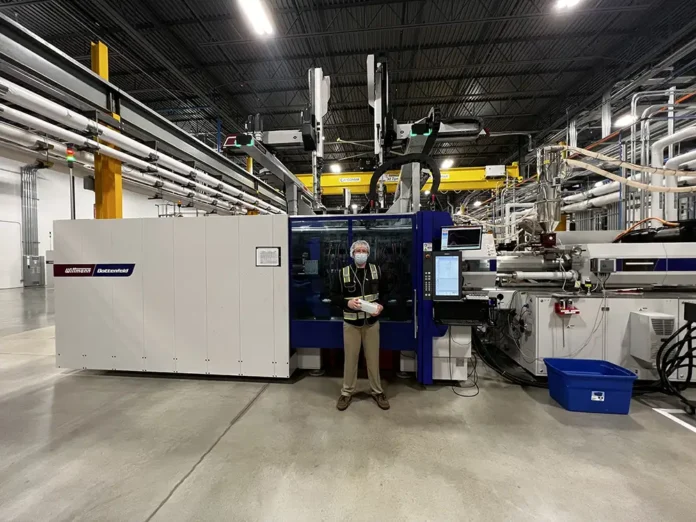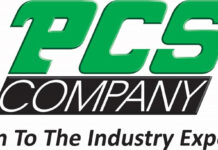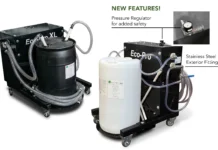During the height of the COVID-19 pandemic, Comar – a contract manufacturer of medical and packaging solutions – saw an opportunity to expand its operations by purchasing a plant across town from a building it had outgrown. To outfit the plant, Comar once again heavily relied on WITTMANN all-electric injection molding machines and easy-to-program robots to add to its capabilities.
Comar’s primary focus at its original 26,000 sq. ft. plant in West Bend was molding three sizes of container lids for multiple disinfectant wet wipe customers. The production of 80 mm, 105 mm and 120 mm wet-wipe lids rose over 50% and “could have doubled that during the pandemic because demand was so high,” according to Plant Manager Jim Spalding. Comar also began producing the canisters by adding an extrusion blow molding cell, which is complemented by additional blow molding cells in Comar’s Sheboygan, Wisconsin, facility.
In addition to manufacturing wet wipe canisters and lids, Comar’s ISO 9001 and SQF-certified West Bend facility can produce products for other industries including nutraceutical packaging. Automation is vital to Comar’s operations and customer value proposition – its West Bend facility alone houses 20 WITTMANN robots and seven complete workcells. In the summer of 2020, Comar was nearing maximum capacity at its West Bend facility. Spotting an established molding plant across town, Spalding alerted his bosses about that building becoming available – and Comar’s corporate leadership leased it. Built in 2005, that plant had been occupied by another molding group, so it already was designed to house molding machines and plant infrastructure.
On Labor Day 2021, Comar “ripped the bandage off” and officially shut the smaller West Bend plant. By October, the new plant was online, with some brand-new equipment thanks to having a much roomier 160,000 sq. ft. to work with.
Comar’s new West Bend facility features 22 injection molding machines ranging from 180-550 US tons, seven of which are WITTMANN all-electric EcoPower Express IMMs with B8 controls including four new turnkey units that joined three others ordered and delivered during the pandemic. While keeping a fraction of the existing machinery and equipment, Comar added many improvements to the new facility including central resin systems, chillers, cranes, reinforced concrete flooring, and other infrastructure.
The new machines that Comar added in 2020 were the first Wittmann EcoPower Xpress Machines purchased in the US. These all-electric high-speed molding machines manufacture thin wall lids produced in stack tools. The lids are for round blow molded containers. Each machine was equipped with dual high-speed WITTMANN 833 Pro series robots.
Comar employs high cavitation precision molds on the new WITTMANN machines that perform ultra-fast cycle times. “These are sophisticated, high-precision tools, making lids as well as other challenging molded products,” Spalding explained. Comar optimizes its molding processes by installing RJG eDart® systems on machines, which enables precise monitoring and control of key plastic variables.
Comar partnered with WITTMANN representative Norstech Plastics Equipment in Burlington, Wisconsin, to outfit and service the new facility. “I can’t say enough about WITTMANN and Norstech including Brian Heugh and Dan Luke, for their support in getting the new machinery up and running during the pandemic,” Spalding said. He also said Chicago-based DevLinks, a WITTMANN integrator that developed the IML workcells, was instrumental in providing much-needed support.
As part of its diversification, Comar’s West Bend facility will produce closures for vitamin bottles and jars and lids for the nutraceutical industry. Molds for those items will come from Comar’s LaMirada Plant in California. In-mold labeling (IML) also is a growing part of Comar’s business, and the facility features two cells for producing labels embedded in wipes canisters.
Two New WITTMANN Workcells Purchased for Stack Mold Medical Application
“All Comar plants have the autonomy to buy the machines and equipment they need,” said Spalding, who joined the company in April 2009 when it was West Bend Plastics, which Comar purchased in 2018. “We had discussed trying to standardize companywide but found that was sub-optimal in some cases.” Instead, Comar created guidelines that all new machinery and equipment must meet and focused on standardizing machine platforms within plants where technically feasible.
When researching what machinery to buy for the latest Comar medical molding application, management asked Spalding for his opinion. “We had some Comar representatives attend the recent K show in Germany, where they saw a stack molding demonstration at the WITTMANN booth,” he said. “They reached out to me as someone with a lot of experience with WITTMANN. I was able to provide feedback on the great experience we had with all of our WITTMANN machine and robot additions.”
Comar ultimately purchased and now operates two WITTMANN workcells, one in California and one in New Jersey, running what Spalding calls a ‟highly visible medical project.” While details of the application are proprietary, Comar says it is a stack mold application integrated with other equipment in a fully automated line in an ISO-8 cleanroom environment to manufacture devices for a plasma apheresis process.
WITTMANN Robots and Ease of Programming
Before joining West Bend, Spalding worked with Philips Medisize and MGS Manufacturing – he first encountered WITTMANN robots in that period.
“Learning and training folks to use robots is easy with WITTMANN,” Spalding asserted. “Our new technicians love them. It’s hard enough teaching technicians how to use multiple IMMs – it’s almost impossible with multiple brands of robots. And, the ease of working with WITTMANN robots helps to recruit and keep workers.”
Comar mainly uses WITTMANN’s R8 robots and some older R7s from 2005 that still works well. “We plan to upgrade these older models at some point,” Spalding noted, “and WITTMANN programs are really easy to use, so that won’t be a major issue.”
Not only are WITTMANN robots exceeding expectations, he added, but “WITTMANN’s one-stop shopping is incredibly important – and one phone call is all you need for service and support.” This played a large part in Comar selecting WITTMANN integrated workcells, which include the company’s molding machines, robots and auxiliaries.
For more information, visit www.wittmann-group.com.





